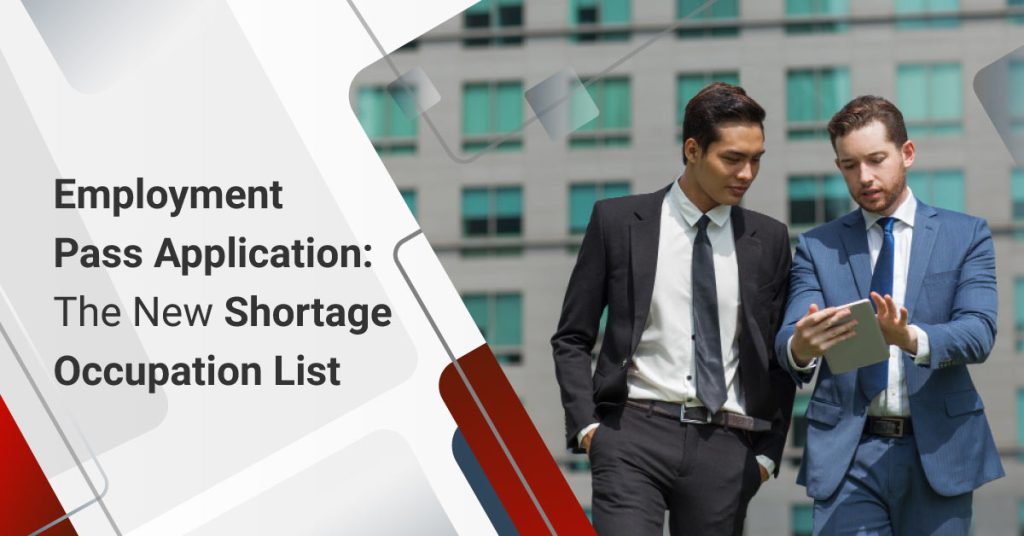There is no secret about Singapore’s thirst for talent — the city-state is going through its most significant talent shortage in 16 years, with 84% of companies in Singapore reporting talent shortages.
The new Complementarity Assessment Framework (COMPASS) and Shortage Occupation List (SOL) are vital in Singapore’s efforts to attract and retain foreign talent, addressing skills gaps in various sectors.
Applying for a Singapore Employment Pass (EP) is the most common way for foreign professionals and executives to work in Singapore, and the SOL brings several changes to the EP application process.
Let us take a look at the implications for businesses, and how the new COMPASS framework will be implemented.
Related Read: An Overview of the ONE, EP, and PEP Work Passes »
How Will the COMPASS Framework Affect EP Applications?
The COMPASS framework kicks in on 1 Sept 2023. What is this upcoming framework about, and how will it affect EP applicants?
Objectives and Benefits
The COMPASS framework is an excellent tool for Singapore employers seeking to attract high-quality foreign professionals while simultaneously strengthening the local workforce.
The framework’s emphasis on complementarity and diversity can help businesses build a robust core team with a broad range of skills and knowledge, ensuring long-term success in a highly competitive global market.
Furthermore, the transparent and predictable system provides businesses with greater clarity and certainty in manpower planning, making it easier to identify the right candidates for their workforce needs.
Overall, the implementation of the COMPASS framework is a step in the right direction for Singapore’s employment landscape.
Key Components
COMPASS comprises a revised EP eligibility and a points-based system. 40 points are required to pass COMPASS and are allocated to the four foundational criteria as in the image below.
| Individual Attributes | Firm-Related Attributes | |
| Foundational Criteria | Salary | Diversity |
| Pegged to average PMET salary for industry | Candidate has to enhance nationality diversity in the company | |
| Qualifications | Support for Local Employment | |
| Applicant’s qualifications | Pegged to local PMET share relative to industry peers | |
| Bonus Criteria | Skills Bonus (Shortage Occupation List) | Strategic Economic Priorities Bonus |
| Applies to candidates with jobs that have skill shortages | For government partnerships for aspiring innovation or globalisation activities |
Each criterion is scored as:
- 20 points – exceeds expectations
- 10 points – meets expectations
- 0 points – does not meet expectations
Applications that meet expectations (earning 10 points each) for salary, qualifications, diversity, and support for local employment will pass COMPASS requirements.
If these criteria points do not meet 40 points, the applicant will need to make up the required points by exceeding expectations in other criteria or gaining bonus points in the bonus criteria of skills bonus (for a job in the SOL), or strategic economic priorities bonus.
The New Shortage Occupation List (SOL)
The Singapore government has created a Shortage Occupation List (SOL) that will kick in together with the introduction of the COMPASS framework.
Purpose of the SOL
The SOL aims to identify roles in high demand and with insufficient local workforce supply, making it easier for businesses to fill these positions with foreign talent.
These roles receive bonus points during the EP application process, facilitating a smoother recruitment process for employers. It is designed to go together with efforts in growing Singapore’s local graduate pipeline.
Roles Included
The SOL comprises 27 shortage roles across various sectors, including information and communications technology, life sciences, and financial services. A complete list can be found on MOM’s website.
Adapting to the New COMPASS Framework
How can businesses adapt to the new COMPASS framework, especially for those looking to hire? Navigating the new system may be unfamiliar to employers who are unsure of its effects. Here are some actions they could take:
Reviewing Current Employment Pass Holders
Businesses should begin reviewing their existing EP holders to ensure they meet the new salary requirements and other eligibility criteria under the COMPASS framework. This will help employers prepare for any potential challenges during the EP renewal process.
Adapting Recruitment Strategies
With the new framework’s emphasis on complementarity, employers may need to revise their recruitment strategies to focus on foreign candidates who can meet the new criteria.
This may involve adjusting job advertisements, interview processes, and onboarding procedures to align with the new guidelines.
Compliance With New Regulations
Employers must ensure they comply with all new regulations under the COMPASS framework, including accurate reporting of salary, qualifications, and job roles during the EP application process.
Related Read: Types of Work Passes in Singapore »
Non-compliance may result in penalties or rejection of EP applications, so it’s important to get this right.
| Criteria | Old Framework | New Framework |
| Eligibility Criteria | Minimum salary requirement | Two-stage eligibility framework |
| Stage 1 | Meeting the qualifying salary | Points-based assessment for salary, qualifications, diversity, support for local employment |
| Stage 2 | N/A | Bonus points for skills bonus (SOL) and strategic economic priorities bonus |
| Application Date | Before September 1, 2023 | From September 1, 2023 |
Your internal team may well be equipped to undertake these new changes, but if required, talk to a professional services provider who is familiar with these changes, such as InCorp.
Again, non-compliance may result in penalties or rejection of EP applications, so in-depth knowledge will be a necessity.
Let InCorp Handle Your EP Applications
The implementation of the COMPASS framework and SOL will bring significant changes to the EP application process in Singapore.
While there will be a need for employers to invest time in understanding the new rules and prepare for the upcoming changes, the new framework will allow Singapore employers to maintain a competitive edge in the global market.
InCorp’s Immigration services can support your business as you navigate the changes brought about by the new SOL and COMPASS framework.
Our team of experts can provide guidance on the revised EP application process, helping you identify the right talent for your organisation while staying fully compliant. Contact us today to find out more about how we can help you with the EP application process in Singapore.
Contact our team
FAQs
What is the purpose of the Shortage Occupation List (SOL)?
- The SOL identifies roles in high demand and with insufficient local workforce supply, making it easier for businesses to fill these positions with foreign talent.
I am unsure of how the SOL will affect my EP applications. Who can I turn to for help?
- InCorp’s successful team of immigration experts is familiar with and knowledgeable of MOM’s latest updates. We are ready to help you tackle unfamiliar aspects of the application!
How long does it take for my EP applications to process?
- It usually takes up to 8 weeks. Please contact our immigration advisors to find out more.



